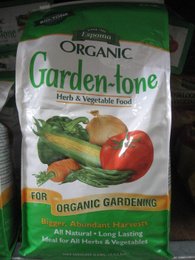Natural Fertilizer for Plant Nutrition

For you plants to be healthy and grow they need sunlight, water and fertilizer. Most of the nutrients a plant needs can be obtained from a good quality garden soil. If you make your own garden soil for your vegetable or flower garden you most likely will not need to add any fertilizer. If you mulch your garden, the mulch breaks down and will be adding nutrients to it each year. Light turning over of the soil will help blend the decomposed mulch down into the root zone to feed your vegetables.
Macronutrients
Most fertilizers contain 3-main macronutrients: nitrogen (N), phosphorus (P) and potassium (K). They usually will be boldly listed as 3-4-4, 5-5-5, 4-3-4, etc. The first number will be the nitrogen content as a percentage, the second will be phosphorus and the third will be the potassium content.
Plants are not able to utilize the chemical elements directly, but are able to do so from chemical compounds. For example the nitrogen may be in the form of ammonium nitrate, phosphorus in the form of phosphate and potassium in the form of potash.
Some of the secondary macronutrients are: calcium (Ca), magnesium (Mg), and sulfur (S).
Micronutrients
Plants also require some micronutrients such as: Boron (B), chlorine (Cl), chrome (Cr), cobalt (Co), copper (Cu), iron (Fe), manganese (Mn), molybdenum (Mo) and zinc (Zn).
Soil pH
The soil pH is what determines whether we consider the soil to be acid or alkaline. A soil pH of 7.0 is considered neutral. Most plants will grow well in a slightly acid soil pH range of 6.0 to 6.9.
Some plants are more acid loving such as azaleas, rhododendrons, blueberries, rhubarb and horseradish. These will grow better in acid soils with a pH range of 4.5 to 5.5.
There are some plants in the bean family that grow better in a more alkaline soil pH with a range of 7.0 to 7.5.
Organic Fertilizers
Organic fertilizers are usually derived from organic natural sources from plant or animal matter and contain carbon. The package may list some ingredients such as: hydrolyzed feather meal, pasteurized poultry manure, cocoa meal, bone meal, alfalfa meal, etc. These are usually waste products from various kinds of food or vegetable production. One advantage is that they need to break down in the soil to slowly release the nutrients to the plants over time. Organic fertilizers can be found online at Gardener's Supply as well in your local garden center.
Inorganic Fertilizers
Inorganic fertilizers are not derived from natural organic sources. These fertilizers often come from minerals such as potash, phosphate rock and lime that are mined from the earth. Sulfur is often found deep underground in solid form. Holes would be drilled through the surface soil and rock to reach the deposit. Steam is then injected into the sulfur to melt and liquefy the sulfur crystals and pump the liquid to the surface and then into vats, where it solidified into elemental sulfur.
Inorganic fertilizers tend to be less expensive than organic fertilizers and will supply your plants with the 3-main macronutrients. Since the inorganic fertilizer does not need to decompose over time to supply nutrients to plants it will start to work much more quickly. For this reason it is very important to follow the package directions very carefully to avoid burning and damaging your plants.
Mycorrhizal Fungi
This is a large group of fungus that grows naturally in the soil. They break down the dead plant material and release the nutrients that plants require.
Soil Testing
You should do a soil test before applying any fertilizers. Most garden centers will have several types of soil test kits. Using a hand trowel or shovel take several samples from several spots in your garden, putting them into a pail. Mix the soil samples together and follow the instructions on the soil test kit.
Some garden centers will either at no charge or for a small fee perform the soil test for you. You can also get a soil test done by many County Cooperative Extension offices.
There are 4-basic tests you should be looking for: level of acidity or alkalinity measured as the pH, phosphorous content, potassium content and percentage of organic material. There are other tests that can be done to determine the micronutrients in your soil, but they are rarely needed.
Garden Spikes newsletters give you timely information once or twice a month. Subscribe Free to the Garden Times newsletter below.
Your email address will only be used to send you a newsletter and will never be sold. You can unsubscribe at any time.
